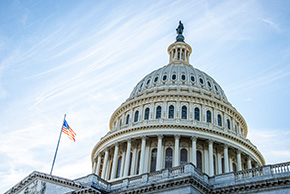WEF Appeals to Congress for Aid and Support
 As the pandemic carries on, the Water Environment Federation (WEF), has submitted an appeal to the United States Congress that speaks to the care shown to the water and wastewater community. Their appeal aims to deal with many of the struggles that are faced by those in the water and wastewater Industry. The appeal outlines a congressional backing that brings utility funding and investments for critical infrastructure to the forefront of rebuilding and strengthening the industry. This call-to-action to the Congress also highlights the need for help to low-income customers who may be unable to pay their utility bills.
As the pandemic carries on, the Water Environment Federation (WEF), has submitted an appeal to the United States Congress that speaks to the care shown to the water and wastewater community. Their appeal aims to deal with many of the struggles that are faced by those in the water and wastewater Industry. The appeal outlines a congressional backing that brings utility funding and investments for critical infrastructure to the forefront of rebuilding and strengthening the industry. This call-to-action to the Congress also highlights the need for help to low-income customers who may be unable to pay their utility bills.
The reason we find this striking such a cord is because of the age and pervasiveness of water/wastewater systems throughout the United States. With 50,000 drinking water utilities and 15,000 wastewater utilities scattered throughout the United States, there is much work to be done to ensure that as many people as possible have proper access to safe and clean drinking water and that lakes, streams and environments don’t suffer from inappropriately treated wastewater.
To truly understand what is being brought to the forefront with Congress, you have to look at the tidbits that comprise the larger issue:
- During the Coronavirus pandemic, water and wastewater utilities have taken a hit. Collectively the industry is seeing losses of millions of dollars in revenue. With these monetary losses come challenges for local communities stretched so far as to not being able to maintain proper water infrastructure. WEF is asking Congress to give budgetary assistance to local water and wastewater utilities as part of the Coronavirus response legislation.
- An additional step in the Congressional ask is covered by the HEROES Act approved by the House of Representatives earlier this year. Per this act, $1.5 billion will be given to utilities to help them forgive water rates being charged to low-income customers.
- This Congressional call-to-action has accrued signatures from groups such as the American Water Works Association, Association of Metropolitan Water Agencies and others.

